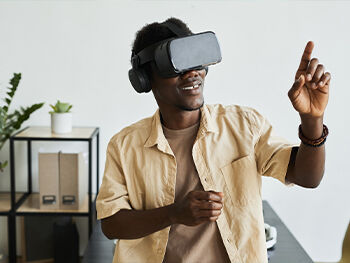Researchers secure Facebook grant to make VR/AR more accessible
 Researchers from the Digital Media Technology (DMT) Lab have been awarded a Facebook grant to address the lack of accessibility features in virtual and augmented reality (VR/AR) hardware and software.
Researchers from the Digital Media Technology (DMT) Lab have been awarded a Facebook grant to address the lack of accessibility features in virtual and augmented reality (VR/AR) hardware and software.
The research team were awarded the grant after submitting their proposal to identify the challenges faced by disabled people using VR/AR technology and identify opportunities for the future development of devices and experiences.
The future of augmented and virtual reality
As AR and VR develops and becomes more mainstream, it is vitally important that the technology is accessible to all users and that experiences are inclusive of all communities.
Dr Chris Creed, Dr Ian Williams, and Dr Maite Frutos-Pascual are leading a series of multi-disciplinary sessions that bring together academics, charities, disabled people, and disability specialists to identify key research areas that will inform the development of inclusive AR/VR experiences.
Principal Investigator Dr Creed says:
'Augmented and virtual reality holds significant potential to transform how we work, learn, and engage with others. However, there has been a lack of work exploring the challenges associated with these technologies for disabled people.'
The research agenda Chris and the team are developing aims to both understand the potential of these technologies to support disabled people and investigate the wider implications of growing VR/AR popularity on marginalised groups.
Collaborating with end-users
The cornerstone of the project involves collaborating with end users and specialists to create an understanding of the requirements for disabled people across a wide spectrum of visual, physical, auditory, and cognitive impairments.
The team will then consider ways to address these challenges, and produce a research agenda based on their findings to highlight priority areas that require further attention from the wider community. These findings will then be used to accelerate the development of inclusive AR/VR experiences.
The team led the first workshop on 11th November, which brought together leading international academics, representatives from national charities (e.g. RNIB), assistive technology specialists, people with impairments, and leading industry organisations (e.g. GSK, Ultrahaptics). The event explored and identified key barriers around immersive platforms for disabled people.
Dr Creed said:
'We’re delighted to be awarded this prestigious grant from Facebook that will support our ongoing research around the development of inclusive technologies for disabled people. Augmented and virtual reality holds significant potential to transform how we will interact with future digital platforms, so it is essential that these technologies are fully accessible to everyone. This grant presents an important opportunity to build a substantial community of leading international experts and stakeholders to help ensure we can collectively inform and realise this goal over the coming years.'
Head of DMT Lab and Co-PI Ian Williams added:
Find out more about the project here.